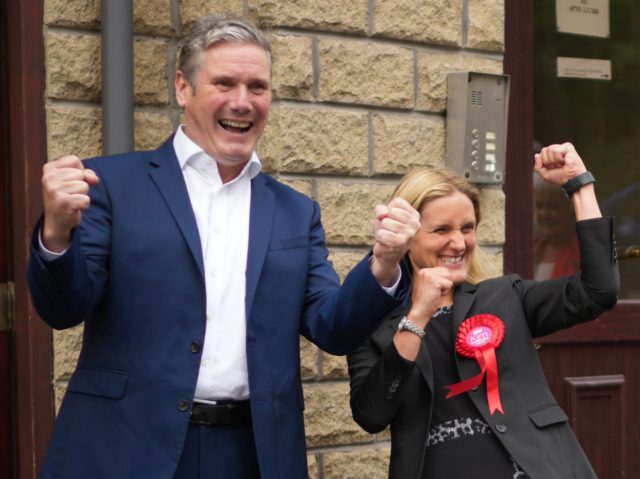Pollsters made a big song and dance about how they’d learnt lessons in the wake of their comprehensive failure to foresee Brexit. Yet even when the laser-focus of the country’s greatest political minds bears down on just one constituency, Westminster still finds the British public inscrutable.
Going by the state of British punditry on Friday, the Batley and Spen by-election (special election) is good news for British opposition leader Sir Keir Starmer personally but of no great consequence to either the Labour or Conservative parties.
By holding the seat by a whisker, Sir Keir sees off a leadership challenge, for now. He claims that this is a new beginning for Labour but nobody believes it; meanwhile, the unassailable majority the Conservatives enjoy in Parliament remains rock solid.
Fine. But what of the election having completely defied the expectations of Westminster and the total failure of the pollsters and prognosticators to foresee what became a shock, even “sensational” result?
Little elections are big news for the parties; they can set narratives and capture imaginations in a way other political set pieces don’t. Last night, Boris’s Conservatives wanted to keep pushing the ‘Red Wall falling’ narrative, and Starmer needed to cling on to his leadership of the Labour party. Consequently, a lot of resources are poured into these battles — the parties send their hit squads, the establishment media their political editors, pollsters fire up the telephone banks.
In short, in the brief period of excitement leading up to special elections, residents are scrutinised as creatures under a microscope. And despite being the subject of this close attention, Westminster still woke up surprised on Thursday after the subjects of their observation failed to act as predicted.
Labour Clings on to Batley and Spen by a Few Hundred Votes in Surprise Result https://t.co/jxTANGjCAH
— Breitbart London (@BreitbartLondon) July 2, 2021
Labour insiders were so convinced their party was going to lose the seat, we are told, that plans to launch a coup against leader Sir Keir were well advanced and being openly discussed in the daily papers. That is a high level of certainty.
The Conservatives, it seems, felt so sure they were going to win they seemed to hardly bother campaigning. Strategy chiefs now stand accused of running an extremely risk-averse campaign and even of keeping their candidate away from the media, implying a strong feeling that the fight was theirs to lose. That is a high level of certainty.
The polling has inevitably come under scrutiny, given just two weeks ago it was predicting a comfortable Conservative win. More interesting, perhaps, is how spectacularly it failed to assess support for minor party candidate George Galloway, who ruthlessly courted the Muslim vote to take nearly 22 per cent, smashing the six per cent predicted.
The Independent’s Chief Political Commentator John Rentoul gave the polling industry a magic hand wave for its underperformance, explaining that constituency polls are “hard” and that the sample size of the poll which got Westminster so excited last month was very small.
If these facts are so self-evident — that the poll was trash and always was, because it was a flawed attempt at an uphill struggle as claimed — this begs the question, why did the pollster bother at all? Can this white-collar industry, staffed by intelligent and experienced thinking people, shrug off poor performance forever? How can you simultaneously benefit from defenders pointing out that your product was never going to be very good, given the circumstances, yet still expect to be paid to produce more of the same?
As Polling Closes YouGov Says Remain on 52, and Leave on 48 https://t.co/XC1oCOHf8r pic.twitter.com/epZv0A4ROR
— Breitbart London (@BreitbartLondon) June 23, 2016
In the middle of the last decade, the pollsters and pundit class went through a serious period of introspection, they claimed, after failing to predict back-to-back the 2015 general election, the 2016 Brexit referendum, and the U.S. presidential election.
The industry howled that they had learned their lessons, claimed they had absolutely figured out why they were calling the Brexit referendum for Remain just hours before the people voted for Leave. The fact is, over five years later voters are still frequently inscrutable.
There is a serious point to all this. Our political elite claim to represent our interests and govern on our behalf. But it remains the case, it seems, that despite their best attempts to understand, predict, and appeal to British voters, they remain a baffling mystery to Westminster.
In an age where government by diktat has become a fact of life — thanks, coronavirus — this has serious ramifications.
40% of Parents Don’t Want LGBT Lessons for 6-Year-Olds, Pollsters Say They Must Be ‘Persuaded’ https://t.co/UmJdecyFqU
— Breitbart London (@BreitbartLondon) September 12, 2020

COMMENTS
Please let us know if you're having issues with commenting.